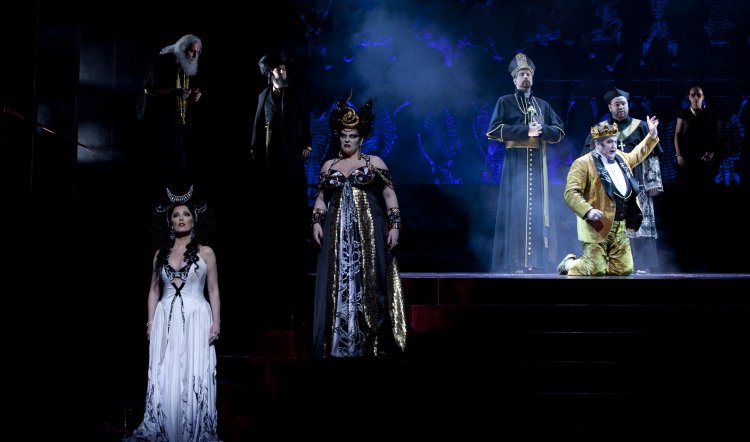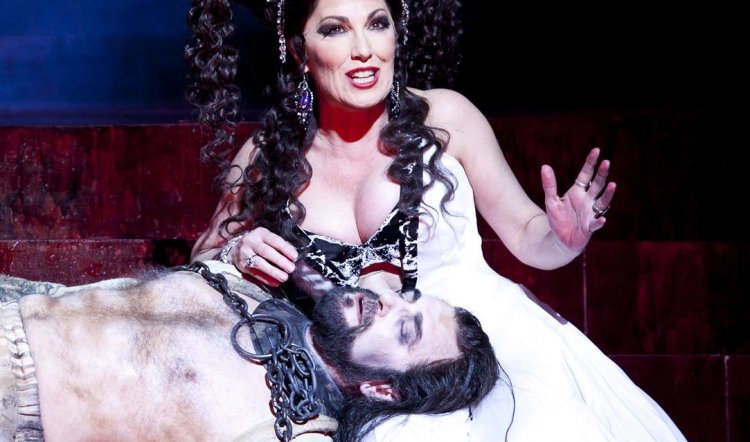
SALOME
SALOME, Opera Australia in the Joan Sutherland Theatre, Sydney Opera House, October 12-November 3, 2012. Photos by Lisa Tomasetti: Cheryl Barker, Jacqui Dark, John Pickering and company; right: Barker and John Wegner.
It says a lot about the way Gale Edwards works and about the team she chooses to work with - set designer, Brian Thomson, costume designer Julie Lynch, lighting designer John Rayment and, for Salome, choreographer Kelley Abbey - that in her program notes, Edwards makes uncommonly generous reference to the co-creatives. These vital collaborators rarely get a mention in such an essay, which is most often solely about the director's vision. As it is, the whole of this new Salome is so much a sum of its parts that Edwards's underlining of that fact is one of the keys to understanding what the company has achieved.
Based on Oscar Wilde's notorious play of 1893 and first seen by a shocked and reeling public in 1905, Richard Strauss's one-act opera was an instant and controversial hit. Since then however life has imitated art and diluted its social and emotional impact. Familiarity and lack of creative imagination have also contributed to often reducing the work to something of a museum piece with the usually risible cavorting of an unwilling soprano in the middle of it. Tackling the "Dance of the Seven Veils" is possibly the trickiest part of successfully re-staging Salome therefore, and in this instance the legendary interlude is a spectacular highlight of an all-round spectacular production.
The creative intent is instantly obvious as the curtain rises on a set consisting of stepped tiers and a central platform that gleam as if drenched in blood - fresh, streaked, dried, old, layered, spattered - repulsive and weirdly beautiful all in one. In the middle of the central platform is an ornate circular grille that covers the cistern in which Jokanaan (John Wegner) is incarcerated - and from where his echoing, disembodied voice is heard. Above this, in a stylised grouping that cynically suggests The Last Supper, a long, sumptuously-laden table is surrounded by the feasting guests of the Tetrarch of Judea, Herod (John Pickering). Behind them hang dismembered carcasses from which hunks of meat are hacked by the guzzlers - who ought to suffer Francis Bacon nightmares, but probably don't.
The visual feast is lavishly garnished with costumes that are at once repellently opulent and comical and offer startling contrast to the music. Herod's gold Elvis suit is made incongruous by the Birkenstock sandals in which he pads about and the edgy bite he injects in his salacious wheedling. Herodias (Jacqueline Dark), in a don't-mess-with-me characterisation of the perpetually angry queen, sports a coiled golden serpent on her head and jewelled breastplates the size of dustbin lids on her bosom. Her Kabuki-style make-up and demeanour is a jolting reminder of Brecht's poetic observation, "What a strain it is to be evil."
Meanwhile, the representatives of various versions of the Almighty are gathered at the feast to gorge and argue and jostle for prominence and favour. Kanen Breen, Gennadi Dubinsky, Sitiveni Talei, Graeme Macfarlane, Benjamin Rasheed, Brad Cooper and Shane Lowrencev are equal opportunity offenders of (virtually) all major religious sensibilities, but sing their complex ensembles like angels under the baton of maestro Johannes Fritzsch.
In the title role, a relatively plainly-garbed Cheryl Barker is the sulky, teenage temptress whose thwarted sexual ambition is the driver of the piece. Openly lusted after by her stepfather, adored from afar by the handsome young officer, Narroboth, (David Corcoran) and worried over by her mother's page (Sian Pendry), Salome pouts and flounces, eager to spread her sexual wings. Like so many nymphets, ancient and modern, Salome is fully cognisant of her rapidly burgeoning Kardashian-esque power - the triumph of sex over substance. As every man within sniffing distance trips over his tongue in pursuit of this simmering chimera, the only conclusion to be reached is that thwarting her demands is a likely to be a very bad idea indeed.

In the person of John Wegner, Jokanaan/John the Baptist is everything the men of Herod's court - and Herod himself - are not. Where they are effete, lascivious and heedlessly amoral, the prophet is physically imposing, unselfconsciously masculine and sexually magnetic. Those attributes also mean that through the warm beauty of the music given to Jokanaan and the singer's compelling voice, rather than the usual sanctimonious, Pell-ish fundamentalist, it is revealed that he is not immune to Salome but rather, struggles to withstand her allure. The retributive majesty of his spurning of Salome is therefore the inevitable catalyst for her vengeful rage. It's a disconcerting reminder that she is basically still a spoilt brat who might just as happily revert to pulling wings off flies when she has nothing better to do.
Cheryl Barker is breathtaking in the title role. Since her unforgettable Mimi in the now-legendary Lurhmann-Martin La boheme she has excelled for Opera Australia as a naturally gifted actress and soprano. Unbelievably, it's now just over 20 years since that role during which time Barker has continued to explore and cultivate her voice and repertoire with electrifying results. And her interpretation of Salome is her finest performance yet. Initially, the voice and characterisation are girlish and light yet in the course of her journey, sublime power and awesome implacability soon take over. By the end, when Salome's terrible whim has been obeyed, love and lust are depicted at their most perversely twisted as she finally gets the kiss she demanded.
It's a performance that has to be both overwhelming and true because the aforementioned Edwards-Abbey "Dance of the Seven Veils" raises the sexual politics stakes to such a level that nothing else will do. The director and choreographer stage the dance as a series of classic male fantasies. It begins with a deceptively winsome Carroll Baker-Baby Doll, but she's a "gotcha!" moment. Having suckered the audience with cuteness into a flurry of relieved giggles, the dance slips and slides into increasingly sexually- and politically-charged territory and images. There's not a giggle in the house by the end of it and the current public debate around the "F" word are almost visible in the air. Yes indeed, feminism is alive and well, flexing her limbs and pulling on the gloves once more!
In this thoughtful, imaginative and magnificent interpretation of the piece, Salome is once again a work of art as wondrously frightening now as it was in 1905.



